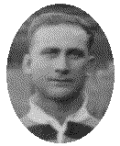|
|
 Frank
Burge is without a doubt, the greatest try scoring forward the game
has ever produced. His achievements and record speaks for itself. Frank
Burge is without a doubt, the greatest try scoring forward the game
has ever produced. His achievements and record speaks for itself. A dashing attacking lock forward who was equally at home in the second row or at prop, Burge began his first grade career in 1911. He scored 146 tries in 154 games before retiring in 1927. It was to become one of Rugby League's most enduring records. No other forward has been able to manage this achievement. In all, Frank 'Chunky' Burge played 149 first grade games for Glebe and 16 games for St George. He represented New South Wales in 1912, 1915, 1919, 1920 and was recalled in 1926. He played no less than 13 Tests for Australia between 1914 and 1923. Born in 1895, coincidentally the same year as the famous meeting at the George Hotel in Huddersfield, Frank Burge became a product of the South Sydney Rugby Union club. Remarkably, he played first grade Rugby Union at just 14 years of age. Following the emergence of Rugby League, Burge joined Glebe in 1911 at the tender age of 16. He was immediately placed on the Kangaroos short list and was unlucky not to tour that year. Burge's distinctive long-striding running style saw him score six tries for Sydney against a touring Maori side in 1922. But he made his mark on the history books in 1920 when he scored the most tries ever in one first grade match, crossing for Glebe no less than eight times - a record which is unlikely to be broken. Following an offer of £200 from club secretary Reg Fusedale, Burge went on to captain-coach St George. By then, Frank Burge was already a household name and could have linked up with any one of a number clubs. But he took up the St George offer knowing full well that they were a club in need. A true professional, Frank Burge scored nine tries in 16 games and instilled a sense of dedication in the St George club. Wooden spooners in 1926, the 'Dragon Slayers' became finalists and runners up in 1927 under Frank Burge's guidance. His philosophy was simple; positive football and pride in yourself and your club. This attitude sank deep into St George and became a foundation stone which would carry the club for many years to come. Club official Alex Mackie recalls Frank Burge as, “the first of the pros.” “He didn’t drink – and in the things like diet and lifestyle, he was ahead of the rest.” Frank then went on to coach Newtown, Canterbury, Wests and Norths before returning to St George in 1937 where once again, he lifted the listless club - this time from second last place to equal second place. A dominant influence, Burge continued to have a positive impact on the game's development well into the 1930s. In the 1980s, an elderly Reg Fusedale remembered Frank Burge in glowing terms: “The finest man I have ever been associated with. He was also the finest try-scoring forward of all time. “He was like a thoroughbred racehorse. If you checked him front – he’d break your jaw. “And he was one of the most colourful characters I have ever met. He was funny as a circus relating his experience of football all over the world. “Apart from being a great footballer, he was a great psychologist… and a businessman.” The mighty Frank Burge, aged 64, passed away suddenly in 1958 after meeting with Fusedale and some other friends for a morning swim at Brighton Baths. He collapsed in Marrickville later that afternoon while en route to a Newtown v Norths match at Henson Park. Frank ‘Chunky’ Burge had a profound influence on the game - this is still evident today in the running style of the modern forward* and the professionalism of the modern coach. In the 1920s, Arthur Hennessy, arguably the code’s first great coach, said of Burge: “I have no doubt that Frank Burge is the greatest player-coach today. He knows the value of possession and he knows everything worth knowing.” *poste
script: In 2004 and in his 12th season, Manly lock forward Steve Menzies
surpassed Frank Burge's record. However, a number of these tries were
scored while Menzies was playing in the centres. |
|
The St George Illawarra
Dragons Rugby League Football Club |